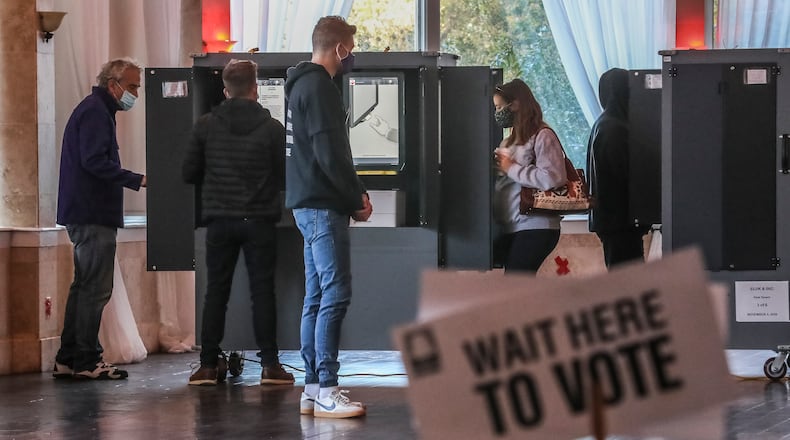Subpoenas sent this month are seeking evidence of whether election conspiracy theorists gained unauthorized access to Georgia voting equipment and copied sensitive files in Coffee County after the 2020 election.
The subpoenas demand documents including ballot images, election data, computer software and the identities of who funded the endeavor. The subpoenas, obtained by The Atlanta Journal-Constitution, were issued by plaintiffs in an ongoing election security lawsuit against Georgia.
In addition, the secretary of state’s office recently opened a separate investigation into allegations of a breach in Coffee County, located about 200 miles south of Atlanta.
The Georgia allegation is the latest example of attempts to gain access to voting computers after Republican Donald Trump lost the 2020 election, similar to incidents in Colorado, Michigan and Pennsylvania.
Trump supporters claimed there was fraud and blamed elections equipment manufactured by Dominion Voting Systems. Recounts, court cases and investigations have repeatedly upheld the election, which Democrat Joe Biden won by less than 12,000 votes in Georgia. Dominion has sued over the unfounded allegations.
A year and a half after the presidential election, it remains unclear whether Coffee County election computers were compromised by individuals pursuing evidence of fraud. Flight records provided by FlightAware.com show a plane from Atlanta visited the county on Jan. 7, 2021 — the day after the Capitol riot in Washington.
The subpoenas target several people who might have been on the flight, including individuals who were involved in a ballot examination in Maricopa County, Arizona, and an investigation of counting errors in Antrim County, Michigan.
If they successfully copied election software from the Dominion equipment used in Georgia, that could have created a security risk, said David Cross, an attorney for the plaintiffs who issued the subpoenas.
“Anyone with access to the equipment either remotely or physically can work their mischief to disenfranchise voters or even to alter election outcomes. That’s why this is so important,” Cross said. “There’s a lot of evidence to suggest someone got access to the equipment.”
State election officials say voting equipment remains secure, and supporters of Trump have said they struggled to gain access to voting equipment in Georgia.
“We thoroughly investigate every single claim, and we’re going to get to the bottom of this,” said Deputy Secretary of State Jordan Fuchs.
A report from the federal government’s cybersecurity agency said earlier this month that voting touchscreens used in Georgia have security vulnerabilities that could be exploited if someone gained access. But the U.S. Cybersecurity and Infrastructure Security Agency also said there’s no evidence those weaknesses have actually been exploited.
Allegations of illicit access surfaced earlier this year with the disclosure of a recording of an Atlanta-area bail bondsman, Scott Hall, who said he arranged a flight to inspect election computers in Coffee County.
“They sent their team down to Coffee County, Georgia, and they scanned all the equipment, imaged all the hard drives, and scanned every single ballot,” Hall said in the recording from March 7, 2021. “We basically had the entire elections committee there, OK, and they said, ‘We give you permission, go for it.’”
Credit: Flightaware.
Credit: Flightaware.
Misty Hampton, the county’s elections director at the time, told the AJC that a local elections board member, Eric Chaney, allowed people seeking to examine election equipment to access the office. Chaney couldn’t be reached for comment.
Former Coffee County Republican Party Chairwoman Cathy Latham has denied that anyone connected to the Trump campaign was given access to election computers.
“That’s bull hockey. If that had happened, that would have been all over town,” Latham said last month. “If you could see where the (elections) building is, it’s right in the middle of downtown. Especially right after November, all during that time, that would have thrown up a red flag.”
An attorney for Coffee County didn’t respond to an email seeking comment.
Among those subpoenaed were Ben Cotton, the founder of the Virginia-based digital security firm CyFIR, who wrote in a sworn court declaration this month in another case that he examined voting systems from Coffee County; Maricopa County, Arizona; Antrim County, Michigan; and Mesa County, Colorado.
Cotton’s firm was a subcontractor in the Arizona ballot review led by Cyber Ninjas. He didn’t respond to a request for comment.
Another subpoena went to Paul Maggio, chief operating officer of Atlanta-based technology company Sullivan Strickler, who reviewed Antrim County election information and was an expert witness for plaintiffs in a lawsuit against the county. Maggio didn’t respond to an email to his company seeking comment.
Documents and depositions are also being sought from Chaney, Hall, Hampton and Latham.
Patrick Byrne, the founder of Overstock.com who wrote the election fraud book “The Deep Rig,” has said he arranged for people to fly to Georgia after the 2020 election. But Byrne wrote on his website that they weren’t able to gain access to voting machines.
The chief information officer for the secretary of state’s office, Merritt Beaver, said in a sworn deposition that he’s suspicious of claims about Coffee County.
“I have seen too many people brag that they could do something in this job, only to find out they weren’t even close to doing what they said they were doing,” Beaver said.
The findings of the court subpoenas and state investigation will eventually be made public, either through the court case or when the findings of the investigation are presented to the State Election Board, which has the authority to levy fines and refer cases to the attorney general’s office.
— Staff writer Johnny Edwards contributed to this article.
About the Author
Keep Reading
The Latest
Featured





